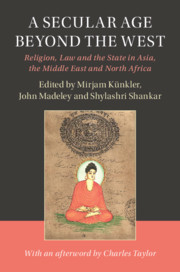14 results
INTRODUCTION - A Secular Age beyond the West: Religion, Law and the State in Asia, the Middle East and North Africa. Edited by Mirjam Künkler, John Madeley, and Shylashri Shankar. Cambridge: Cambridge University Press, 2018. Pp. 440. $120.00 CAD (cloth); $34.99 CAD (paper); $28.00 USD (digital). ISBN: 9781108417716.
-
- Journal:
- Journal of Law and Religion / Volume 36 / Issue 2 / August 2021
- Published online by Cambridge University Press:
- 05 July 2021, pp. 278-282
- Print publication:
- August 2021
-
- Article
- Export citation
Appendix - A Quantitative Take on the Incidence of Taylor’s Three Secularities in the Eleven Country Studies
-
- Book:
- A Secular Age beyond the West
- Published online:
- 15 June 2018
- Print publication:
- 05 July 2018, pp 395-413
-
- Chapter
- Export citation
Dedication
-
- Book:
- A Secular Age beyond the West
- Published online:
- 15 June 2018
- Print publication:
- 05 July 2018, pp vii-viii
-
- Chapter
- Export citation
11 - Enigmatic Variations: Russia and the Three Secularities
-
-
- Book:
- A Secular Age beyond the West
- Published online:
- 15 June 2018
- Print publication:
- 05 July 2018, pp 265-294
-
- Chapter
- Export citation
Copyright page
-
- Book:
- A Secular Age beyond the West
- Published online:
- 15 June 2018
- Print publication:
- 05 July 2018, pp vi-vi
-
- Chapter
- Export citation
Tables and Figures
-
- Book:
- A Secular Age beyond the West
- Published online:
- 15 June 2018
- Print publication:
- 05 July 2018, pp xi-xi
-
- Chapter
- Export citation
Contributors
-
- Book:
- A Secular Age beyond the West
- Published online:
- 15 June 2018
- Print publication:
- 05 July 2018, pp xii-xvi
-
- Chapter
- Export citation
Index
-
- Book:
- A Secular Age beyond the West
- Published online:
- 15 June 2018
- Print publication:
- 05 July 2018, pp 414-422
-
- Chapter
- Export citation
Contents
-
- Book:
- A Secular Age beyond the West
- Published online:
- 15 June 2018
- Print publication:
- 05 July 2018, pp ix-x
-
- Chapter
- Export citation
Preface
-
- Book:
- A Secular Age beyond the West
- Published online:
- 15 June 2018
- Print publication:
- 05 July 2018, pp xvii-xviii
-
- Chapter
- Export citation
14 - Conclusions: The Continued Prevalence of the “Marker State”
-
-
- Book:
- A Secular Age beyond the West
- Published online:
- 15 June 2018
- Print publication:
- 05 July 2018, pp 342-384
-
- Chapter
- Export citation

A Secular Age beyond the West
- Religion, Law and the State in Asia, the Middle East and North Africa
-
- Published online:
- 15 June 2018
- Print publication:
- 05 July 2018
2 - The Curious Case of Religion in the Norwegian Constitution
- from Part I - Constitution Writing and Religion under Limited Sovereignty
-
-
- Book:
- Constitution Writing, Religion and Democracy
- Published online:
- 23 February 2017
- Print publication:
- 02 February 2017, pp 29-48
-
- Chapter
- Export citation
Death and Taxes: The Waning of Swedish Social Democracy
-
- Journal:
- Government and Opposition / Volume 28 / Issue 1 / 01 January 1993
- Published online by Cambridge University Press:
- 28 March 2014, pp. 118-125
- Print publication:
- 01 January 1993
-
- Article
- Export citation



